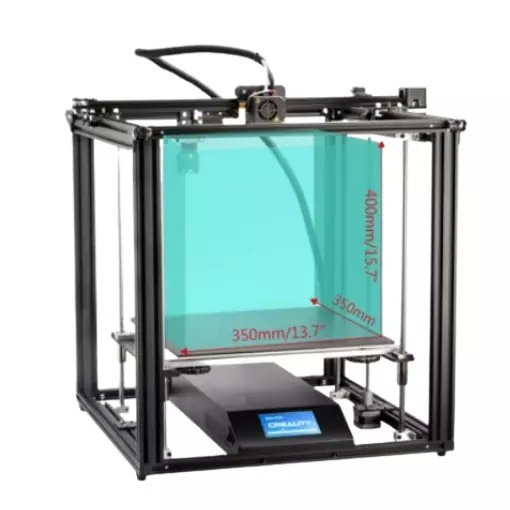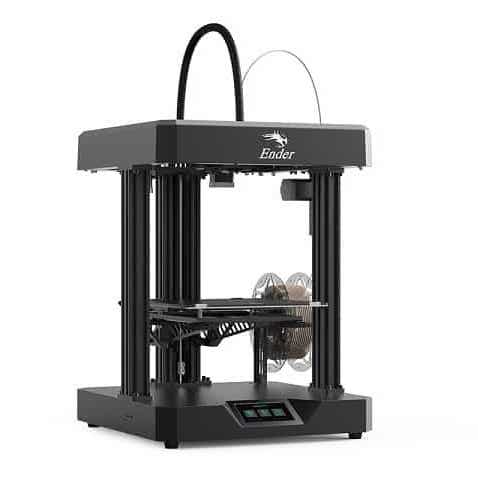Compare Ender 5 Plus vs Ender 7
Comparison between the best 3D printers
Choose the best 3D printer at the best price. The cheapest 3D printers are here.
Buy a 3D printer here with 3D Fila.
 |
 |
|
| Model | Ender 5 Plus[BUY Ender 5 Plus] |
Ender 7[BUY Ender 7] |
| Printing Material | Filament | Filament |
| Buy Filament for Creality 3D Ender 5 Plus | Buy Filament forCreality 3D Ender 7 | |
| Estimated price | $599,00 | $429,00 |
| Manufacturer | Creality 3D | Creality 3D |
| Release Year | 2019 | 2021 |
| Print Volume [mm] | 350x350x400 | 250x250x300 |
| Printer Size [mm] | 632x619x666 | 430x460x570 |
| Weight [kg] | 18,2 | 17,2 |
| Power Loss Recovery | YES | YES |
| Enclosed printer | NO | NO |
| Bed Leveling | Automatic | Manual |
| Filament End Sensor | YES | YES |
| Bed type | Heated | Heated |
| Power supply system | Bowden | Bowden |
| Standard nozzle | 0,4 | 0,4 |
| Maximum Nozzle Temperature [°C] | 260 | 260 |
| Maximum Bed Temperature [°C] | 100 | 100 |
| Maximum printing speed [mm/s] | 180 | 250 |
| Filament holder | YES | YES |
| Camera for supervision | NO | NO |
| Recommended filaments | PLA, TPU, ABS, PETG | PLA, PETG, Tritan, Flex, ABS |
| Recommended slicers | Cura, Simplify, Slic3r | Cura, Simplify, Slic3r, IdeaMaker |
| Maximum Resolution [mm] | 0,1 | 0,1 |
| Processor | 32 bits | Creality CR-FDM V.2.4.S1_V101 32bits |
| Display | Touchscreen TFT 4,3'' | Display touchscreen 4,3'' |
| Power Supply | 24V / 504W | 110/220V / 350W |
| Connectivity | SD / USB | SD / USB |
| Operating systems | Windows, Mac, Linux | Windows, Mac, Linux |
| Date of registration in the system | 2021-04-14 | 2022-11-04 |
| Release date | 2019 | 2021 |
| Extra features | The Ender 5 Plus offers a large print volume (350x350x400 mm) and fast assembly. It includes a BLTouch sensor, but with range limitations. It stands out for its dimensional accuracy, although it requires adjustments to the slicer settings. Despite the noise, its integrated design saves space, and includes features such as a filament sensor and power resumption. Ideal for large projects, it requires refinement in the settings for high-quality prints. | Crealitys Ender 7 printer offers remarkable print speeds, utilizing CoreXY kinematics for precise and fast movement. With a 250x250x300mm build area, dual direct extruder, and custom hotend, the Ender 7 is capable of printing at high speeds, although quality may suffer on smaller prints. Assembly is relatively straightforward, but the machine is noisy and can get hot. Its true speed potential is most noticeable on larger prints, where it outperforms its competitors. |
| Support for multiple colors and materials (AMS and CFS) | NO | NO |
Notes * |
||
| Cost-benefit | 6 / 10 | 7 / 10 |
| Hardware | 2 / 10 | 2.4 / 10 |
| Tela | . | . |
| Print volume | 4 / 10 | 4 / 10 |
| Performance | 1 / 10 | 2 / 10 |
| [BUY Ender 5 Plus] | [BUY Ender 7] |
Conclusion |
| In analyzing the Creality 3D Ender 5 Plus and Ender 7, both printers present unique advantages tailored to different user needs. The Ender 5 Plus, with its larger print volume, is better suited for those working on extensive projects that require dimensional accuracy and greater build space. Although it might not be the most technologically advanced model, it offers a solid balance of features, such as automatic bed leveling and a filament end sensor, which enhances user experience even if it requires some slicer adjustments for the best results. On the other hand, the Ender 7 shines with its impressive printing speed, leveraging CoreXY kinematics for swift movement. This makes it a standout choice for users who prioritize high-speed printing, especially for larger objects, although the smaller prints may lose some quality. Its straightforward assembly and similar feature set—like the dual direct extruder—position it well among competitors for those who appreciate rapid production. In terms of pricing, the Ender 7 is a more budget-friendly option, providing decent performance without sacrificing essential features. Considering the cost-benefit analysis, it offers slightly better value for budget-conscious shoppers or hobbyists seeking to experiment with various materials at faster speeds. Ultimately, the choice between the two will depend on individual project requirements. For those focused on large-scale, precise prints, the Ender 5 Plus presents a compelling option. Conversely, for users emphasizing speed and efficiency on smaller projects, the Ender 7 represents a sensible investment, making it the best choice for those looking for effective performance at a more accessible price point. |

